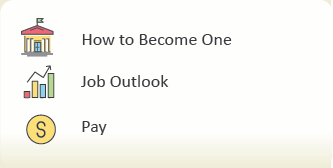An official website of the United States government
 United States Department of Labor
United States Department of Labor
| April 2019
For more information and data, including:

Learn more about this occupation in the Occupational Outlook Handbook.
Landscape architects design, plan, and oversee construction on projects that develop or restore outdoor spaces. I mostly do historic preservation and community development. My work involves doing research, reading city codes or permit processes, writing, and report editing. And there’s a lot of public engagement, meeting with the public to talk about what they want.
I spend a lot of my day in the office, although I also travel. There’s an element of outdoor work, too, for site visits.
Landscape architecture is a broad discipline, and most landscape architects are in the private sector. A lot of that is working for a client where you’re providing design services. Master planning, park planning: It’s all design driven.
But my career has been mainly in the public sector, mostly state government. I worked initially in urban forestry but later with communities on downtown development and urban design. I’m now doing consulting, working with cities and state agencies and with nonprofits.
Landscape architects always have been concerned about environmental stewardship, whether it relates to water, soil, air, or plants. Sustainable design and environmental aspects are central to most of the work we do.
With a lot of my work being more urban based, there is the question of how to design to be sure that we’re protecting the limited resources that we have. Certain practices encourage responsible design, such as reusing materials and protecting water. That’s a big deal in landscape architecture now.
Employers are looking for someone with experience, whether they’ve had an internship or summer jobs or some exposure to an office. And they’re looking for someone who will bring a passion for the work.
It’s also helpful to complement your education with something that gives you credibility but also demonstrates a willingness to go the extra mile, like special studies or a certificate in sustainable design. (Note: All states also require landscape architects to be licensed.)
I think a good focus is on dealing with water. There’s so much right now with localized weather patterns causing flooding and resulting in excess storm water. Traditionally, communities turned to engineering solutions. But now we’re being asked not just how fast to get rid of it, but how to capture it for reuse. Things like water management, resilient design—landscape architects are good at that.
I’m just so fortunate to do what I do. My work has been primarily helping people, and I like doing that. It’s rewarding when someone has an issue and I can help them get beyond it.
And the colleagues I work with day to day and across the country: It’s good to be part of a group that cares so much about quality of life.
The biggest challenge is that our numbers are small, but the needs are great. We need more people studying landscape architecture to help address the environmental and social problems we face.
It’s never too early to start networking. We are a small profession, and everybody knows everybody.
Talk to people. We’re happy to help others find their way. If someone is busy, go to the next person; you will eventually find someone who can help.
No. My first degree is in economics; I didn’t know landscape architecture existed when I was in college. That’s actually pretty common. People often care about the environment or public health or some other quality of life issue, and, somewhere along the way while doing something else, they stumble across landscape architecture.
For many of us, the interest starts with something like, “My grandmother always worked in the garden, and I have this feeling about how important the land is.” And to me, that’s what landscape architecture is all about.
Elka Torpey, "Landscape architect," Career Outlook, U.S. Bureau of Labor Statistics, April 2019.